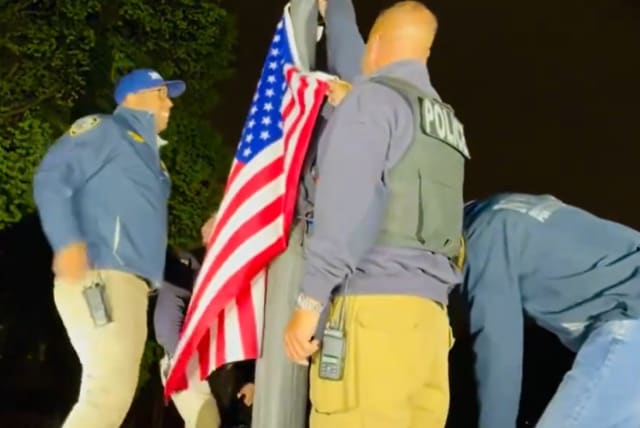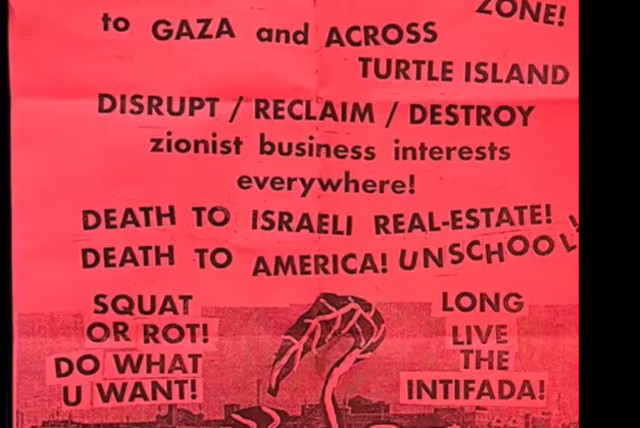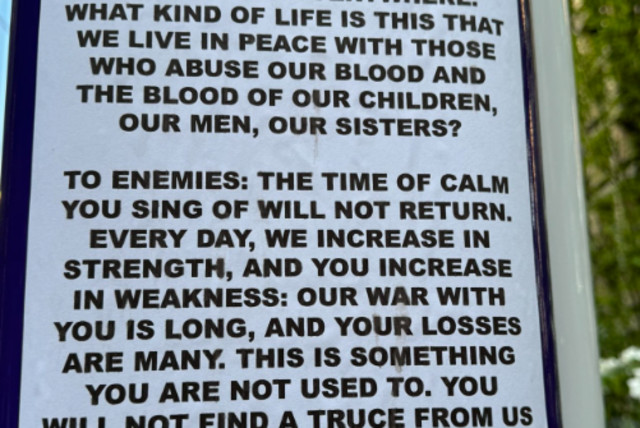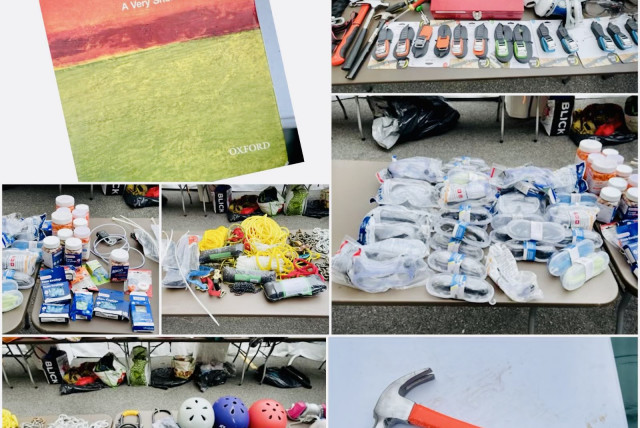NYPD clear schools and restore US flag, decry anti-US, pro-terror content

The NYPD clears campuses amid rising tensions: removal of Palestinian flag sparks controversy and arrests as protests escalate.
New York Police Department top officials expressed anger on Friday about anti-American and pro-terrorist posters and literature as they cleared five university and college campuses this past week, which on Wednesday saw officers remove a Palestinian flag from a City College of New York flagpole to restore the US flag.
NYPD Deputy Commissioner Kaz Daughtry shared a video of officers pulling down the Palestinian flag and of a person who the officer said was a university staff member crumpling up the flag and tossing it to the ground.
“An incredible scene and proud moment as we have assisted City College of New York in restoring order on campus, culminating in raising Old Glory once again on their campus flagpole,” Daughtry wrote on social media. “Agitators illegally removed an American flag from a flagpole, discarded it, and chose to hang their own flag. While we were going through the campuses, we saw many American flags torn, burned, and desecrated.”
NYPD Chief of Patrol John Chell said on X on Wednesday that they had found numerous pieces of “disturbing” literature when they cleared the encampments at New York University and The New School on Friday, and at Columbia University on Wednesday.A red poster shared by Chell called to “disrupt, reclaim, destroy Zionist business interests everywhere! Death to Israeli real-estate! Death to America!”
“Long live the intifada!” the poster continued.
Denouncement of anti-American sentiments
NYPD Chief of Transit Michael Kemper denounced the call of “death to America,” saying on social media that it was counter to what the police and those that had fought for the country believed in.
“If you think the words written on this piece of paper are disturbing... you should hear the vile, disgusting, hateful, and threatening words coming out of the mouths of far too many of these so-called ‘peaceful protesters,’” said Kemper.
Daughtry shared another poster from NYU that was signed by the Lions’ Den, a Nablus-based Palestinian terrorist movement.
“To Friends: Those who call for peace are chasing a mirage. As for the resistance: Strike them everywhere,” read the note. “To our Enemies: The time of calm you sing of will not return. Every day we increase in strength, and you increase in weakness; our war with you is long, and your losses are many. This is not something you are used to. You will not find a truce from us.”
Further, Within Our Lifetime, a protest group responsible for many high-intensity protests in NYC, also had posters displayed, as seen in pictures posted by Daughtry.
One pamphlet called on activists to reject the police narrative of “outside agitators,” arguing for the unity of cause between student and non-student activists. Daughtry pointed to another “inflammatory” pamphlet calling for training in how to engage with instances of escalation with police.
"We can choose to prioritize de-escalation trainings or we can choose to prioritize escalation trainings,” read the pamphlet. “We can choose to learn how to build effective barricades, how to link arms most effectively to resist police attacks, or what type of expanding foam works best on the kind of doorknobs present in our universities.”
Chell said that the literature was proof of radical indoctrination of students by professional agitators.
“Who is funding and leading this movement?” asked Chell.
Daughtry also pointed to the signage and the radicalization process that was unfolding on campuses.
“It is clear that these protesters are organized and well funded,” Daughtry said on Friday. “What is also clear is that our youth are being radicalized and in some cases have been encouraged to escalate their protests into violence.”
Chell said that while some NYU and TNS students left when they requested, they had to arrest 56 protesters. 14 of those arrested were from NYU, according to NYU President Linda Mills.
Mills wrote in a statement that they had requested NYPD assistance in response to the increasingly violent rhetoric, including the literature cited by the NYPD, and clashes between protesters and counter-protesters. She said that there were bomb threats on April 25 and 26, threats against her, and vandalism of a building where she, faculty members, and their families live.
On Wednesday, “One person – someone who objected to the demonstration – was struck with a thrown bottle. Eggs were thrown at demonstrators. A counter-protester was put in handcuffs. There were several calls from the encampment for outside actors to join their ‘militant political space,’” said Mills. “The University’s senior leadership and I were compelled to conclude that we could not tolerate the risk of violence any longer and that we could not responsibly or in good conscience wait until something drastically worse were to happen in order to act.”
TNS issued a letter to the NYPD on Friday advising law enforcement that the student and non-student activists were trespassing on the campus.
“The actions and continuing escalation of these individuals are a substantial disruption of the educational environment and regular operations of the university,” said TNS. “It is with deep regret that we request the NYPD’s help to remove the trespassing individuals and those impeding entrance to the building.”
The NYPD entered Fordham University on Thursday at the request of the administration, arresting some of the 30 students after some refused to disperse from the encampment. Fordham said in a letter to the police that they wished them to use care when removing the activists, and that they had appealed to the police with reticence.
The school said that they sought to prevent further escalation and that the disruptions posed a “clear and present dangers to persons, property, and the substantial functioning of the university.”
City College and Columbia University, the progenitor of the encampment movement, also saw police intervention on Wednesday at the request of the administrations. Reuters reported that over 100 students were arrested at Columbia.
Columbia President Minouche Shafik said that they had attempted to negotiate with the protesters but that the Tuesday morning breaking into and barricading of Hamilton Hall was a “drastic escalation.”
Shafik said that the university respected protest and free speech, “But students and outside activists breaking Hamilton Hall doors, mistreating our Public Safety officers and maintenance staff, and damaging property are acts of destruction, not political speech. Many students have also felt uncomfortable and unwelcome because of the disruption and antisemitic comments made by some individuals, especially in the protests that have persistently mobilized outside our gates.”
Daughtry said on Friday that at Columbia they had found gas masks, ear plugs, helmets, goggles, tape, hammers, knives, ropes, and a book on terrorism.
“These are not the tools of students protesting, these are the tools of agitators, of people who were working on something nefarious,” said Daughtry.
Pro-Palestinian groups at the campuses denounced police intervention, and protested for the release of detainees. They indicated that they would continue to protest, though it is unclear if they will attempt to restore the encampments.
Jerusalem Post Store
`; document.getElementById("linkPremium").innerHTML = cont; var divWithLink = document.getElementById("premium-link"); if (divWithLink !== null && divWithLink !== 'undefined') { divWithLink.style.border = "solid 1px #cb0f3e"; divWithLink.style.textAlign = "center"; divWithLink.style.marginBottom = "15px"; divWithLink.style.marginTop = "15px"; divWithLink.style.width = "100%"; divWithLink.style.backgroundColor = "#122952"; divWithLink.style.color = "#ffffff"; divWithLink.style.lineHeight = "1.5"; } } (function (v, i) { });



